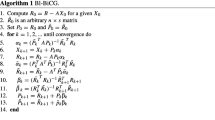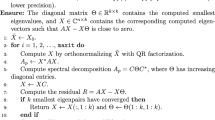Abstract
The conjugate gradient (CG) method is the most basic iterative solver for large sparse symmetric positive definite linear systems. In finite precision arithmetic, the residual and error norms of the CG method often stagnate owing to rounding errors. The groupwise update is a strategy to reduce the residual gap (the difference between the recursively updated and true residuals) and improve the attainable accuracy of approximations. However, when there is a severe loss of information in updating approximations, it is difficult to sufficiently reduce the true residual and error norms. To overcome this problem, we propose a mixed-precision algorithm of the CG method using the groupwise update strategy. In particular, we perform the underlying CG iterations with the standard double-precision arithmetic and compute the groupwise update with high-precision arithmetic. This approach prevents a loss of information and efficiently avoids stagnation. Numerical experiments using double-double arithmetic demonstrate that the proposed algorithm significantly improves the accuracy of the approximate solutions with a small overhead of computation time. The presented approach can be used in other related solvers as well.








Similar content being viewed by others
References
Abdelfattah, A., Anzt, H., Boman, E.G., et al.: A survey of numerical linear algebra methods utilizing mixed-precision arithmetic. Int. J. High Perform. Comput. Appl. 35(4), 344–369 (2021). https://doi.org/10.1177/10943420211003313
ADVANPIX: multiprecision computing toolbox for MATLAB. https://www.advanpix.com/
Aihara, K., Komeyama, R., Ishiwata, E.: Variants of residual smoothing with a small residual gap. BIT Numer. Math. 59(3), 565–584 (2019). https://doi.org/10.1007/s10543-019-00751-w
Clark, M.A., Babich, R., Barros, K., Brower, R.C., Rebbi, C.: Solving lattice QCD systems of equations using mixed precision solvers on GPUs. Comput. Phys. Commun. 181(9), 1517–1528 (2010). https://doi.org/10.1016/j.cpc.2010.05.002
Davis, T.A., Hu, Y.: The University of Florida sparse matrix collection. ACM Trans. Math. Softw. 38(1), 1–25 (2011). https://doi.org/10.1145/2049662.2049663
Dekker, T.J.: A floating-point technique for extending the available precision. Numer. Math. 18(3), 224–242 (1971). https://doi.org/10.1007/BF01397083
Demmel, J.W.: Applied Numerical Linear Algebra. SIAM, Philadelphia (1997)
Greenbaum, A.: Estimating the attainable accuracy of recursively computed residual methods. SIAM J. Matrix Anal. Appl. 18(3), 535–551 (1997). https://doi.org/10.1137/S0895479895284944
Hestenes, M.R., Stiefel, E.: Methods of conjugate gradients for solving linear systems. J. Res. Natl. Bur. Stand. 49(6), 409–436 (1952). https://doi.org/10.6028/jres.049.044
Higham, N.J.: Accuracy and Stability of Numerical Algorithms, 2nd edn. SIAM, Philadelphia (2002)
Higham, N.J., Mary, T.: Mixed precision algorithms in numerical linear algebra. Acta Numer. 31, 347–414 (2022). https://doi.org/10.1017/S0962492922000022
Jeannerod, C.P., Rump, S.M.: Improved error bounds for inner products in floating-point arithmetic. SIAM J. Matrix Anal. Appl. 34(2), 338–344 (2013). https://doi.org/10.1137/120894488
Mukunoki, D., Ogita, T.: Performance and energy consumption of accurate and mixed-precision linear algebra kernels on GPUs. J. Comput. Appl. Math. 372, 112701 (2020). https://doi.org/10.1016/j.cam.2019.112701
Ogita, T., Rump, S.M., Oishi, S.: Accurate sum and dot product. SIAM J. Sci. Comput. 26(6), 1955–1988 (2005). https://doi.org/10.1137/030601818
Ozaki, K., Ogita, T.: Generation of linear systems with specified solutions for numerical experiments. Reliab. Comput. 25, 148–167 (2017)
Sleijpen, G.L.G., van der Vorst, H.A.: Reliable updated residuals in hybrid Bi-CG methods. Computing 56(2), 141–163 (1996). https://doi.org/10.1007/BF02309342
Williams, S., Waterman, A., Patterson, D.: Roofline: an insightful visual performance model for multicore architectures. Commun. ACM 52(4), 65–76 (2009). https://doi.org/10.1145/1498765.1498785
Acknowledgements
The authors would like to thank the reviewers for their careful reading and insightful comments. The authors are most grateful to Dr. Takeshi Ogita, Professor of Waseda University, for offering the CPU environment in Sect. 5. This study was also supported by Grant number JP20H04195 and JP20KK0259 from the Grants-in-Aid for Scientific Research Program (KAKENHI) of the Japan Society for the Promotion of Science (JSPS).
Author information
Authors and Affiliations
Corresponding author
Ethics declarations
Conflict of interest
The authors declare no conflicts of interest with regard to this work.
Additional information
Publisher's Note
Springer Nature remains neutral with regard to jurisdictional claims in published maps and institutional affiliations.
About this article
Cite this article
Aihara, K., Ozaki, K. & Mukunoki, D. Mixed-precision conjugate gradient algorithm using the groupwise update strategy. Japan J. Indust. Appl. Math. 41, 837–855 (2024). https://doi.org/10.1007/s13160-024-00644-8
Received:
Revised:
Accepted:
Published:
Issue Date:
DOI: https://doi.org/10.1007/s13160-024-00644-8
Keywords
- Linear systems
- Conjugate gradient method
- Groupwise update
- Mixed-precision arithmetic
- Double-double arithmetic




